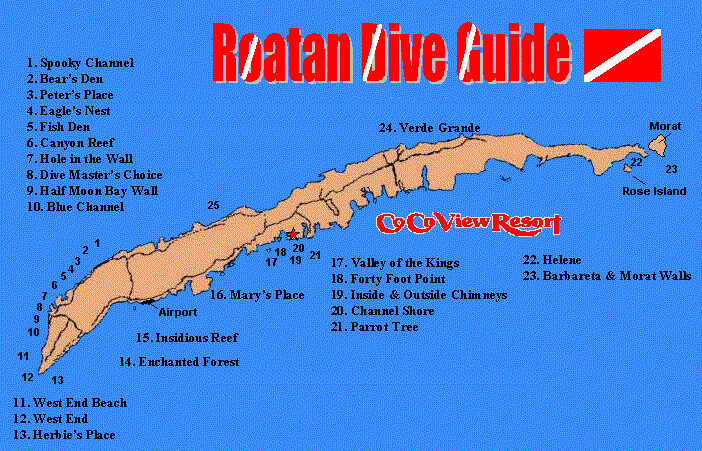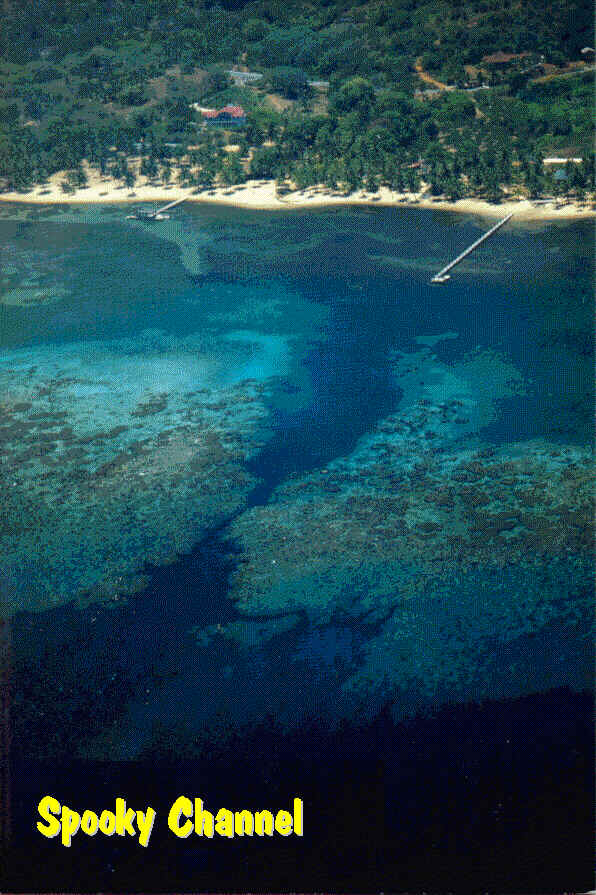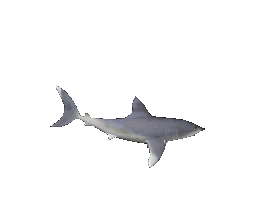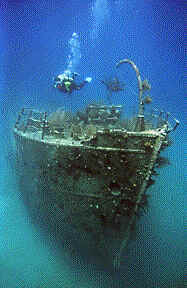
Roatan Scuba and
Snorkeling Dive Guide
The islands are part of the Bonacca Ridge which is a submerged mountain range. The tops of the mountain form the islands which are surrounded by the world's second largest barrier reef in the world after Australia's. The Central American barrier reef extends throughout the coasts of Belize and Honduras and is only 300 feet off shore in most areas.
Each dive site is described below.

1. Spooky
Channel: Depth 5 to 95 ft w/ boat or shore access 
Spooky Channel is located directly off the end of the Sunnyside
or BIBR pier. Some of the old divers refer to this location as
Wrasse Hole. There are a maze of zigzags and tunnel like effects
leading throughout the reef at depths of up to 95 feet.
Snorkelers and divers have very easy access to this area from the
end of the pier. Boat moorings are on the inside and outside of
the reef.
2. Bear’s
Den: Depth 30 to 105 ft w/
boat access
Bear's Den is located just to the west of Spooky Channel and is
well known for its honeycombed vertical coral wall, a large
underwater cave, and a tunnel. The tunnel is about 80 feet deep
and located very near the boat mooring. The tunnel runs 100 feet
before opening at a large steep canyon. The cave is located by
swimming further to the east from the mooring (five minutes). The
entrance is located in at a depth of 40 feet.
3. Peter’s
Place: Depth 10 to 130+
feet with boat access
Peter's Place is known for its diverse variety of fish and the
mini wall that rises from a depth of about 40 feet. Triggerfish,
black durgons and sea fans mark this mini wall. Near the deeper
ledge are pillars of coral.
4. Eagle’s
Nest: Depth 25 to 130 feet with boat access
Eagle's Nest or Perch has a high knoll along the shelf of the
reef. Water depth ranges from 25 to 130 feet along this area.
Large spotted eagle rays are commonly found here along with turtles. Large barrel sponges and sea fans are seen
between the black durgons,
triggerfish,
and grouper.
 5.
Fish Den: Depth 10 to 130 feet with boat access:
5.
Fish Den: Depth 10 to 130 feet with boat access:
Fish Den is the local hot spot for lots of fish. Water depth
ranges from 10 to 130 feet where large schools of blue tangs, grunts, parrotfishes, yellowtail
snapper, and flounder are found. The shelf drops off around 35 feet
to 130 feet and forms a spectacular mini wall with lots of
sponges and soft corals.
6. Canyon
Reef: Depth 10 to 155 feet
with boat access
Canyon Reef has lots of towers of pillar corals in a depth of 10
to 150 feet. The terrain looks like a canyon with massive clefts
in the walls and ravines. There are tunnels that zigzag to the
shallow areas. The current in this area makes this a great drift
dive location.
7. Hole
in the Wall: Depth 45 to
135+ feet with boat access
Hole in the Wall has numerous caves and chutes at depths of 45 to
135 feet. One very large chute is 30 feet wide and drops to 140
foot depth. Big grouper, barracuda, spotted
rays, and hawksbill
turtles are common in
this location.
8. Dive
Master’s Choice:
Depth 5 to 110 feet with shore or boat access
Dive Master's Choice is directly in front of the Seagrape
Plantation Resort and about 120 feet from the ironshores.
Snorkelers enter the water from cement steps in the ironshores,
the only practical way of getting in or out of the water in this
area. The shelf has a gentle slope and then drops off
dramatically.
9. Half
Moon Bay Wall: Depth 20 to
130+ feet with shore or boat access
Half Moon Bay Wall is a semicircular wall that begins at 20 feet
as a gradually declining slope. At depth of 60 feet, the slope
levels off for s short distance than drops to over 100 feet in a
semi-circular wall. Hard corals, sea fans, sponges, and soft
corals are found on the upper sections. The drop off has large
orange elephant ear sponges, azure vase sponges, and soft corals.
This area was once above water and it shows the evidence of
prehistoric above water times.
10. Blue
Channel: Depth 5 to 50
feet with shore or boat access
Blue Channel is located about 300 feet from Suena Del Mar's
beachfront. A 30 foot deep channel parallels the shore. The
southern wall of the channel has caves.
11. West
End Beach: Depth 5 to 130
feet with shore or boat access
West End Beach is a popular snorkeling area. The sandy beach
gently slopes to the barrier reef which is about 10 to 20 feet in
depth. All along the beachfront the coral reef is spotted with
channels and coral formations. Fresh water springs feed several
spots in this area and the water change is dramatic. This is an
excellent area for small fish.
12. West
End: Depth 10 to 130+ feet
with boat access
Steep ridges mark the area and are surrounded by flats that have
a tremendous amount of large sponges. Narrow fissures and
pinnacles dot the underwater landscape. Current is strong in this
area.
13. Herbie’s
Place: Depth 20 to 150+
feet with boat access
Herbie's Place is on the south shore of Roatan in depths of 20 to
150 feet. Drift diving is common in this area and some very large
barrel sponges will be seen. Most dive masters will drop you off
and you'll drift to another dive site known as Pablo's Place.
14. Enchanted
Forest: Depth 8 to 110
feet with boat access
Enchanted Forest is located on a crest about a half a mile south
of the reef. The boat mooring is on a large flat sandy area in
about 30 feet of water. The upper part of the crest has barrel
and vase sponges with lots of soft coral formations. The slopes
of the ridge contain multicolored sponges and polyps.
 15. Insidious
Reef: Depth 30 to 130+
feet with boat access
15. Insidious
Reef: Depth 30 to 130+
feet with boat access
Insidious Reef is located away from the barrier reef on a gentle
sloping offshore bank. The south wall of the area is full of sea
life from french
angelfish to sharks and manta
rays. The water depth
in this area ranges from 30 to 130 feet.
16. Mary’s
Place: Depth 30 to 130
feet with boat access
Mary's Place is one of the more spectacular dive spots on the
south side of the island. The site has a steep wall that is
bisected in one area. Hard and soft corals are abundant in this
area. The wall has many fissures where jewfish, yellowtail
snapper, silversides, and grouper will be found. Nurse
sharks, large grouper,
lobster and crab are seen under the many ledges and
along the bottom of the 100 foot wall.
17. Valley
of the Kings: Depth 5 to
130+ feet with boat access
The shallow depth makes this a favorite with the snorkelers. The
wall and its ledge are marked with many large coral pillar
columns. Azure vase sponge is prominent in this area. There are
many over hangs and they are covered with sponges, white
gorgonians, red and pink rope sponges, and a variety of black
corals. Night dives to this area are routinely scheduled.
18. Forty
Foot Point: Depth 40 to
130 feet with boat access
At a depth of 40 feet there is a vertical wall. Gray snapper are
known to forms schools along with other varieties in this area. Spadefish, horse-eye
jack, yellowtail
snapper, and permit can be found schooling near the surface and
along the wall. The area is filled with lobster, crabs, octopuses, and grouper that seem to come alive at night. The light
intensity below forty feet is low and you should consider
bringing a light.
19. Inside
& Outside Chimneys:
Depth 10 to 120 feet with boat access
The southern wall is laced with several sand chutes which
highlight the reef spider crabs and lettuce corals here. There is
a slight current from the east. The current brings the plankton
that feed the soft corals, vase sponges, tube sponges, and
gorgonians. Two large chimneys rise from a depth to 60 feet to
about 20 from the surface. There is a large man size orange
elephant ear sponge that marks the entrance to the chimneys. Turtles, blue
chromis, and black grouper are common along the edge of the ledge.
 |
20. Channel Shore: Depth 30 to 120 feet with shore or boat
access Located between CoCo View and Fantasy Island resorts, you find easy access to a submerged DC-3 which lies in about 30 feet of water and the wreck of the Prince Albert (PHOTO, LEFT), a 140 ft island freighter with an intact superstructure. The DC3 fuselage is intact. Water quality here can be poor due to land run off or from tidal action. There are two walls to dive very close to the channel and caution should be observed with the local boat traffic. Nearby areas are known as CoCo View Wall and Neumanns' Wall. 21. Parrot
Tree: Depth 5 to
130+ feet with boat access 22. Helene:
Depth 20 to 130+ feet with boat access |
23. Barbareta
& Morat Walls: Depth
50 to 130+ feet with boat access
The Barbareta and Morat Walls is a 3 mile reef running parallel
to the islands. Huge sponges and gorgonians are common here.
Large orange elephant ear sponges are surrounded by other variety
of rope sponges and a great variety of marine life. Most of the
marine species that are found in the Bay Islands can be seen
here. This dive location makes a good drift dive spot for
multiple dives.
24. Verde
Grande: Depth 6 to 40 feet
with boat access
Similar to Spooky Channel, Verde Grande has a system caverns and
cuts through the reef. Most dive groups are dropped on one side
of the reef and then picked up on the other side after you
explore the caverns, elkhorn coral, and other shallow water
corals and marine species. An underwater light is suggest for
this area and take care to follow the dive guide briefing.
25. 1912
Wreck: Depth 6 to 40 feet
with boat access
The wreck is partially exposed at the surface and large pieces of
steel including the ship's boiler can be seen. The reef in this
area also has a deep water cut and walls that can be explored.
The reef system extends for miles in each direction and many
marine species will be found. Be sure to swim the inside and
outside reef areas to get an appreciation of the corals and
marine life that is typical along the northern coastline.
Not listed: Anka's Place, Menagerie, Too-tall-too-small, Caribe Point, Calvin's Crack, Gold Chain Reef, Parrot Tree Wall, Carey's Place.
![]()
Common Fish/Crustaceans and Coral of the Caribbean that are regularly spotted around Roatan:
Angelfish
Barracuda
Black durgon
Blennies
Blue chromis
Blue runner
Blue Tang
Butterflyfish
Eels, Moray & Spotted
French angelfish
Grouper
Grunts
Harlequin bass
Jewfish
Lobster
Manta rays
Octopus
Parrotfish
Porcupinefish
Rays
Sargent Majors
Sea Horses
Sharks, Nurse, Sand, Reef, Black tip, White tip, Whale
Shrimp
Silversides
Spider crab
Spotted eagle rays
Tang
Trunkfish
Turtles (Hawksbill)
Yellow Snapper
Active Night Fish:
Basket stars
Brittle stars
Eels
Flounders
Octopuses
Spider Crabs
Corals:
Azure vase sponges
Barrel Sponges
Black corals
Brain Coral
Elk Horn Coral
Gorgonians (Sea Fans)
Lettuce coral
Orange elephant ear sponges
Pillar coral
Red and pink rope sponges
Home - CoCo View - CoCo View Photos - Grenada - UW Photo Tips
ęDrew Thompson,
1999-2000
All Rights Reserved